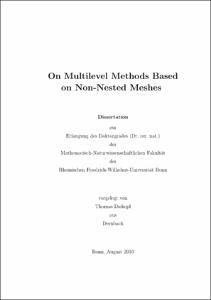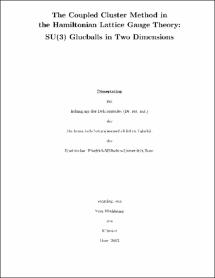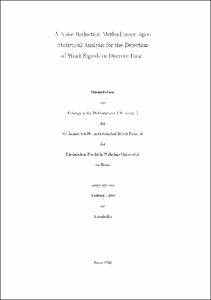Dickopf, Thomas: On Multilevel Methods Based on Non-Nested Meshes. - Bonn, 2010. - Dissertation, Rheinische Friedrich-Wilhelms-Universität Bonn.
Online-Ausgabe in bonndoc: https://nbn-resolving.org/urn:nbn:de:hbz:5N-23653
Online-Ausgabe in bonndoc: https://nbn-resolving.org/urn:nbn:de:hbz:5N-23653
@phdthesis{handle:20.500.11811/4692,
urn: https://nbn-resolving.org/urn:nbn:de:hbz:5N-23653,
author = {{Thomas Dickopf}},
title = {On Multilevel Methods Based on Non-Nested Meshes},
school = {Rheinische Friedrich-Wilhelms-Universität Bonn},
year = 2010,
month = dec,
note = {This thesis is concerned with multilevel methods for the efficient solution of partial differential equations in the field of scientific computing. Further, emphasis is put on an extensive study of the information transfer between finite element spaces associated with non-nested meshes.
For the discretization of complicated geometries with a finite element method, unstructured meshes are often beneficial as they can easily be adjusted to the shape of the computational domain. Such meshes, and thus the corresponding discrete function spaces, do not allow for straightforward multilevel hierarchies that could be exploited to construct fast solvers. In the present thesis, we present a class of "semi-geometric" multilevel iterations, which are based on hierarchies of independent, non-nested meshes. This is realized by a variational approach such that the images of suitable prolongation operators in the next (finer) space recursively determine the coarse level spaces. The semi-geometric concept is of very general nature compared with other methods relying on geometric considerations. This is reflected in the relatively loose relations of the employed meshes to each other. The specific benefit of the approach based on non-nested meshes is the flexibility in the choice of the coarse meshes, which can, for instance, be generated independently by standard methods. The resolution of the boundaries of the actual computational domain in the constructed coarse level spaces is a characteristic feature of the devised class of methods.
The flexible applicability and the efficiency of the presented solution methods is demonstrated in a series of numerical experiments. We also explain the practical implementation of the semi-geometric ideas and concrete transfer concepts between non-nested meshes. Moreover, an extension to a semi-geometric monotone multigrid method for the solution of variational inequalities is discussed.
We carry out the analysis of the convergence and preconditioning properties, respectively, in the framework of the theory of subspace correction methods. Our technical considerations yield a quasi-optimal result, which we prove for general, shape regular meshes by local arguments. The relevant properties of the operators for the prolongation between non-nested finite element spaces are the H1-stability and an L2-approximation property as well as the locality of the transfer.
This thesis is a contribution to the development of fast solvers for equations on complicated geometries with focus on geometric techniques (as opposed to algebraic ones). Connections to other approaches are carefully elaborated. In addition, we examine the actual information transfer between non-nested finite element spaces. In a novel study, we combine theoretical, practical and experimental considerations. A thourough investigation of the qualitative properties and a quantitative analysis of the differences of individual transfer concepts to each other lead to new results on the information transfer as such. Finally, by the introduction of a generalized projection operator, the pseudo-L2-projection, we obtain a significantly better approximation of the actual L2-orthogonal projection than other approaches from the literature.},
url = {https://hdl.handle.net/20.500.11811/4692}
}
urn: https://nbn-resolving.org/urn:nbn:de:hbz:5N-23653,
author = {{Thomas Dickopf}},
title = {On Multilevel Methods Based on Non-Nested Meshes},
school = {Rheinische Friedrich-Wilhelms-Universität Bonn},
year = 2010,
month = dec,
note = {This thesis is concerned with multilevel methods for the efficient solution of partial differential equations in the field of scientific computing. Further, emphasis is put on an extensive study of the information transfer between finite element spaces associated with non-nested meshes.
For the discretization of complicated geometries with a finite element method, unstructured meshes are often beneficial as they can easily be adjusted to the shape of the computational domain. Such meshes, and thus the corresponding discrete function spaces, do not allow for straightforward multilevel hierarchies that could be exploited to construct fast solvers. In the present thesis, we present a class of "semi-geometric" multilevel iterations, which are based on hierarchies of independent, non-nested meshes. This is realized by a variational approach such that the images of suitable prolongation operators in the next (finer) space recursively determine the coarse level spaces. The semi-geometric concept is of very general nature compared with other methods relying on geometric considerations. This is reflected in the relatively loose relations of the employed meshes to each other. The specific benefit of the approach based on non-nested meshes is the flexibility in the choice of the coarse meshes, which can, for instance, be generated independently by standard methods. The resolution of the boundaries of the actual computational domain in the constructed coarse level spaces is a characteristic feature of the devised class of methods.
The flexible applicability and the efficiency of the presented solution methods is demonstrated in a series of numerical experiments. We also explain the practical implementation of the semi-geometric ideas and concrete transfer concepts between non-nested meshes. Moreover, an extension to a semi-geometric monotone multigrid method for the solution of variational inequalities is discussed.
We carry out the analysis of the convergence and preconditioning properties, respectively, in the framework of the theory of subspace correction methods. Our technical considerations yield a quasi-optimal result, which we prove for general, shape regular meshes by local arguments. The relevant properties of the operators for the prolongation between non-nested finite element spaces are the H1-stability and an L2-approximation property as well as the locality of the transfer.
This thesis is a contribution to the development of fast solvers for equations on complicated geometries with focus on geometric techniques (as opposed to algebraic ones). Connections to other approaches are carefully elaborated. In addition, we examine the actual information transfer between non-nested finite element spaces. In a novel study, we combine theoretical, practical and experimental considerations. A thourough investigation of the qualitative properties and a quantitative analysis of the differences of individual transfer concepts to each other lead to new results on the information transfer as such. Finally, by the introduction of a generalized projection operator, the pseudo-L2-projection, we obtain a significantly better approximation of the actual L2-orthogonal projection than other approaches from the literature.},
url = {https://hdl.handle.net/20.500.11811/4692}
}









